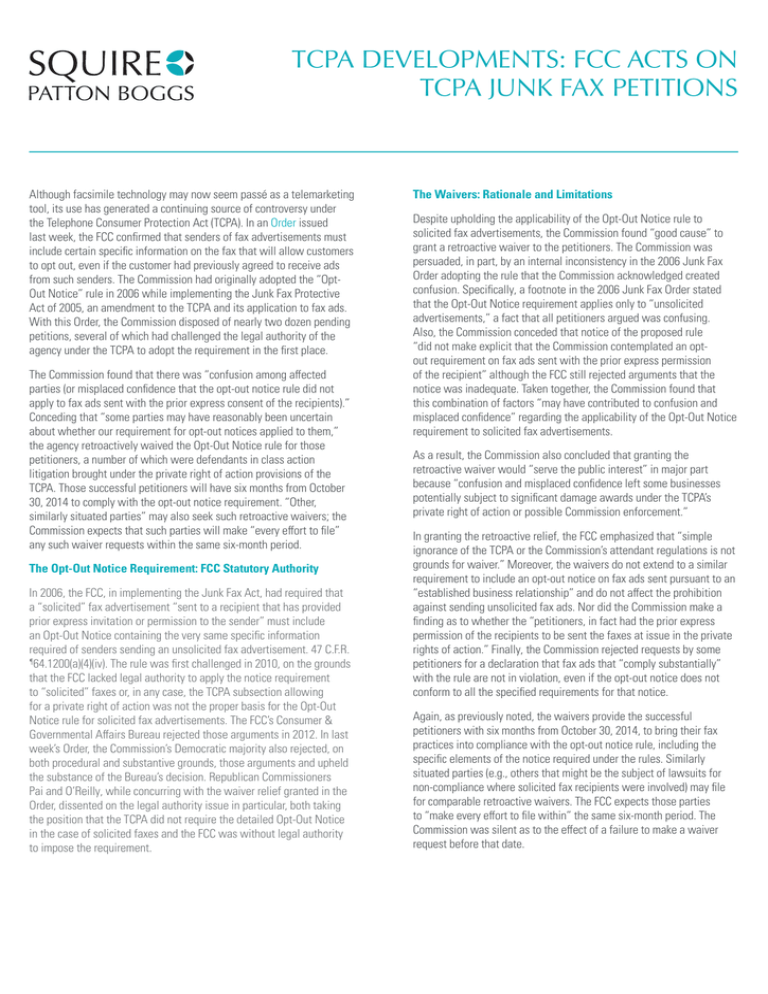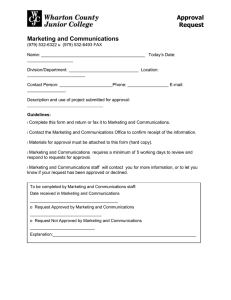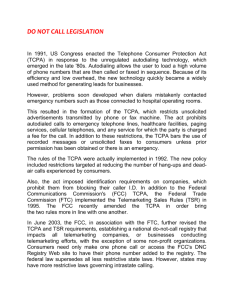
TCPA DEVELOPMENTS: FCC ACTS ON
TCPA JUNK FAX PETITIONS
Although facsimile technology may now seem passé as a telemarketing
tool, its use has generated a continuing source of controversy under
the Telephone Consumer Protection Act (TCPA). In an Order issued
last week, the FCC confirmed that senders of fax advertisements must
include certain specific information on the fax that will allow customers
to opt out, even if the customer had previously agreed to receive ads
from such senders. The Commission had originally adopted the “OptOut Notice” rule in 2006 while implementing the Junk Fax Protective
Act of 2005, an amendment to the TCPA and its application to fax ads.
With this Order, the Commission disposed of nearly two dozen pending
petitions, several of which had challenged the legal authority of the
agency under the TCPA to adopt the requirement in the first place.
The Commission found that there was “confusion among affected
parties (or misplaced confidence that the opt-out notice rule did not
apply to fax ads sent with the prior express consent of the recipients).”
Conceding that “some parties may have reasonably been uncertain
about whether our requirement for opt-out notices applied to them,”
the agency retroactively waived the Opt-Out Notice rule for those
petitioners, a number of which were defendants in class action
litigation brought under the private right of action provisions of the
TCPA. Those successful petitioners will have six months from October
30, 2014 to comply with the opt-out notice requirement. “Other,
similarly situated parties” may also seek such retroactive waivers; the
Commission expects that such parties will make “every effort to file”
any such waiver requests within the same six-month period.
The Opt-Out Notice Requirement: FCC Statutory Authority
In 2006, the FCC, in implementing the Junk Fax Act, had required that
a “solicited” fax advertisement “sent to a recipient that has provided
prior express invitation or permission to the sender” must include
an Opt-Out Notice containing the very same specific information
required of senders sending an unsolicited fax advertisement. 47 C.F.R.
¶
64.1200(a)(4)(iv). The rule was first challenged in 2010, on the grounds
that the FCC lacked legal authority to apply the notice requirement
to “solicited” faxes or, in any case, the TCPA subsection allowing
for a private right of action was not the proper basis for the Opt-Out
Notice rule for solicited fax advertisements. The FCC’s Consumer &
Governmental Affairs Bureau rejected those arguments in 2012. In last
week’s Order, the Commission’s Democratic majority also rejected, on
both procedural and substantive grounds, those arguments and upheld
the substance of the Bureau’s decision. Republican Commissioners
Pai and O’Reilly, while concurring with the waiver relief granted in the
Order, dissented on the legal authority issue in particular, both taking
the position that the TCPA did not require the detailed Opt-Out Notice
in the case of solicited faxes and the FCC was without legal authority
to impose the requirement.
The Waivers: Rationale and Limitations
Despite upholding the applicability of the Opt-Out Notice rule to
solicited fax advertisements, the Commission found “good cause” to
grant a retroactive waiver to the petitioners. The Commission was
persuaded, in part, by an internal inconsistency in the 2006 Junk Fax
Order adopting the rule that the Commission acknowledged created
confusion. Specifically, a footnote in the 2006 Junk Fax Order stated
that the Opt-Out Notice requirement applies only to “unsolicited
advertisements,” a fact that all petitioners argued was confusing.
Also, the Commission conceded that notice of the proposed rule
“did not make explicit that the Commission contemplated an optout requirement on fax ads sent with the prior express permission
of the recipient” although the FCC still rejected arguments that the
notice was inadequate. Taken together, the Commission found that
this combination of factors “may have contributed to confusion and
misplaced confidence” regarding the applicability of the Opt-Out Notice
requirement to solicited fax advertisements.
As a result, the Commission also concluded that granting the
retroactive waiver would “serve the public interest” in major part
because “confusion and misplaced confidence left some businesses
potentially subject to significant damage awards under the TCPA’s
private right of action or possible Commission enforcement.”
In granting the retroactive relief, the FCC emphasized that “simple
ignorance of the TCPA or the Commission’s attendant regulations is not
grounds for waiver.” Moreover, the waivers do not extend to a similar
requirement to include an opt-out notice on fax ads sent pursuant to an
“established business relationship” and do not affect the prohibition
against sending unsolicited fax ads. Nor did the Commission make a
finding as to whether the “petitioners, in fact had the prior express
permission of the recipients to be sent the faxes at issue in the private
rights of action.” Finally, the Commission rejected requests by some
petitioners for a declaration that fax ads that “comply substantially”
with the rule are not in violation, even if the opt-out notice does not
conform to all the specified requirements for that notice.
Again, as previously noted, the waivers provide the successful
petitioners with six months from October 30, 2014, to bring their fax
practices into compliance with the opt-out notice rule, including the
specific elements of the notice required under the rules. Similarly
situated parties (e.g., others that might be the subject of lawsuits for
non-compliance where solicited fax recipients were involved) may file
for comparable retroactive waivers. The FCC expects those parties
to “make every effort to file within” the same six-month period. The
Commission was silent as to the effect of a failure to make a waiver
request before that date.
FCC and TCPA: Road Forward?
Contacts
So what might this action mean for the Commission’s attention to TCPA
issues as it moves toward 2015? A few observations in that regard:
First and foremost, the Commission’s action puts a significant dent in
the list of pending TCPA-related petitions on its docket and potentially
frees up resources to focus on approximately 30 petitions that
deal with other, non-fax-related issues, such as the definition of an
“automatic telephone dialing system” and “called party” under the
TCPA. This may mean FCC action on these issues will arrive sooner
rather than later, a decidedly salutary result as the TCPA class action
cases continue to mount.
Second, the FCC’s action reflects the Commission’s willingness going
forward to use, in certain TCPA contexts, the waiver mechanism as a
means to provide relief in particular factual circumstances with these
pending petitions.
Third, despite the opportunity for retroactive waivers over the next six
months, the division of view on legal authority to impose the rule at
least leaves open the prospect of litigation on that issue in the
DC Circuit.
Fourth, the FCC again referred to the obligation to “balance” the
legitimate interests of businesses with the privacy rights of consumers,
a “standard” that it stressed in decisions earlier this year involving
notices to package recipients and consent in the context of social
media groups. While not explicitly applied here, in those TCPA
decisions the Commission factored into the analysis their view of
whether there was information useful to consumers that consumers
wanted to receive.
Fifth, the grant of the waivers in these special circumstances should
not be interpreted as a relaxation of the FCC’s enforcement attention
with respect to the TCPA, and all aspects thereof. Recent statements
by the FCC Enforcement Bureau chief, combined with a recent
enforcement advisory related to robocalls, suggest that the Bureau will
be active in investigating alleged violations of the TCPA.
Monica S. Desai
Partner, Communications
Washington DC
T +1 202 457 7535
E monica.desai@squirepb.com
Amy L. Brown
Leader – Class Action & Multidistrict Litigation
Washington DC
T +1 202 626 6707
E amy.brown@squirepb.com
Philip M. Oliss
Partner, Litigation
Cleveland, OH
T +1 216 479 8448
E philip.oliss@squirepb.com
Paul C. Besozzi
Partner, Communications
Washington DC
T +1 202 457 5292
E paul.besozzi@squirepb.com
Brian A. Cabianca
Partner, Litigation
Phoenix, AZ
T +1 602 528 4160
E brian.cabianca@squirepb.com
Anne Choi Goodwin
Partner, Litigation
Los Angeles, CA
T +1 213 689 6535
E anne.goodwin@squirepb.com
Squire Patton Boggs has a deep and experienced team advising clients
on all aspects of the TCPA, including the Junk Fax Prevention Act
provisions, from a compliance, counseling, regulatory and litigation
perspective. If you are contemplating taking advantage of the FCC’s
waiver window or there are any questions about this alert or the TCPA
in general, please contact one of the members of our TCPA team listed
in this publication.
The contents of this update are not intended to serve as legal advice related to individual situations or as legal
opinions concerning such situations nor should they be considered a substitute for taking legal advice.
© Squire Patton Boggs.
squirepattonboggs.com
All Rights Reserved 2014
15489/11/14



